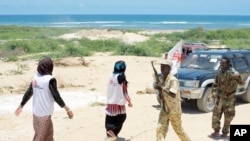The medical aid group Doctors Without Borders works in many of the world’s hot spots, including Somalia, Afghanistan and the Palestinian Territories. However, humanitarian assistance often depends on delicate negotiations and a lot of compromise.
Doctors Without Borders, also known as MSF, has published a new book entitled Humanitarian Negotiations Revealed – The MSF Experience.
In recent years, medical and humanitarian workers have been increasingly put in harm’s way. So much so, many questioned whether “humanitarian space” – the safe zone where aid could be given – was shrinking.
Negotiation inevitable
“We got ourselves 5 workers killed in Afghanistan in 2004. We got 3 workers killed in Somalia, expulsion in Niger and in Sudan. And all those incidents were tended to be seen as consequences of the blurring of the lines between humanitarian action and political and military intervention. And there was that overwhelming feeling that it was getting more and more difficult to work,” said Michael Neuman, director of the MSF research center in Paris and co-author of the book.
He said if medical treatment is to be administered in conflict areas, for example, negotiation is inevitable.
“What we argue in the book is that there is no such thing as an abstract humanitarian space, but that there is huge responsibility from the aid actors themselves to defend and conquer their own space of work through negotiations, through compromises, through power struggle with authorities intersecting with civil society groups, international organizations, governments. And that is what we wanted to explore in this book,” said Neuman.
Negotiations center on a search for common ground.
“You shouldn’t believe in yourself as the bearer of some absolute moral virtue. We have interests, the authorities have interests. And so we have to find common interests between those different parties and groups,” he said.
Piece of the action
Everyone involved in the negotiations wants to benefit from an MSF presence.
“When trying to set up a surgical project in Mogadishu in 2007, we have to gather around this table, virtual table, the warlords, their enemies, their archenemies, the Islamic insurrection, the clan leaders, so that they can all get a piece of it,” he said.
For example, militias may realize their fighters or families can receive medical care at the MSF clinic. Clan leaders may look upon the clinic as giving prestige to their area.
Neuman co-wrote the chapter on Somalia titled Everything is Open to Negotiation.
“If you have expectations of doing anything, of conducting any work in Somalia where there is no government, virtually no health care system, you’ve got to enter into negotiations in every aspect of your work. You have to negotiate renting cars. You have to negotiate how you recruit staff. You have to negotiate the payment of taxes to the interim government or to the rebellion. You have to negotiate the type of activities you’re going to put in place,” he said.
Do no harm?
The ancient Greek physician Hippocrates, called the father of Western medicine, wrote “there were two special objects in view with regard to disease – to do good or to do no harm.” MSF came face to face with that in the Libyan city of Misrata.
Neuman said, “The teams faced a terrible reality when they realized that they were basically treating patients between torture sessions. Patients would be brought to them after they’d been tortured by the police and MSF would help the authorities to put them back on their feet. And after a few days they would be sent back to the detention centers to be tortured again. And of course that’s where you start to believe that your work is meaningless. And in that case the decision was to suspend the project.”
He added, “you fight for what you believe in to the maximum, but know that you may not achieve it all.”
The MSF book states, “Sometimes just holding the line for one’s values as best as one can, making the compromises that one must…is no small victory.”




